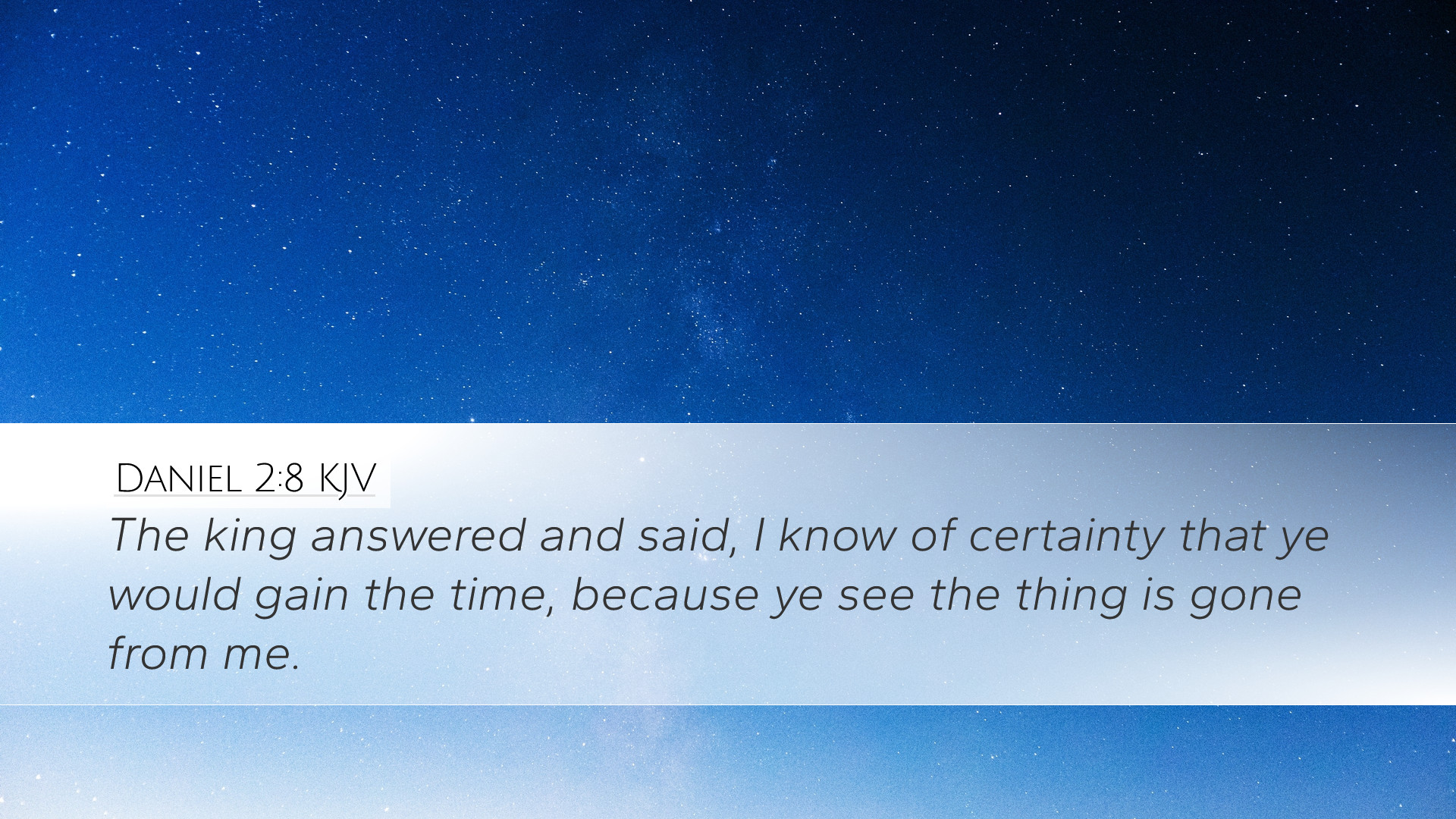Commentary on Daniel 2:8
Verse: Daniel 2:8 - "The king answered and said, I know of certainty that ye would gain the time, because ye see the thing is gone from me."
Introduction
The narrative of Daniel 2 presents a pivotal moment in the life of Daniel amidst the Babylonian exile. This verse reflects King Nebuchadnezzar's growing anxiety and the cunning manipulation of his advisors. A detailed exploration of this verse reveals profound insights into human nature, the nature of authority, and the sovereignty of God.
Contextual Analysis
To understand Daniel 2:8 fully, it is crucial to consider the broader context. Nebuchadnezzar, the king of Babylon, has had a disturbing dream that he cannot remember, yet it troubles him significantly. In his desperation, he summons the wise men of Babylon to interpret the dream without revealing its content. The king is shrewdly aware that they wish to gain time, conscious of their reliance on his favorable disposition.
The Role of the Wise Men
Matthew Henry emphasizes that the wise men represent the pagan wisdom of Babylon, which ultimately proves insufficient when confronted with divine mystery. Their desire to ‘gain time’ speaks to the human tendency to evade responsibility, a theme echoed throughout scripture.
Nebuchadnezzar’s Perception
Albert Barnes highlights that the king's assertion shows his awareness of their tactics. He recognizes that they are merely buying time, which unveils a critical aspect of leadership—an ability to perceive the intentions of subordinates. This signals the deepening distrust between the king and his advisors.
Theological Reflections
This verse elucidates the tension between divine wisdom and human limitations. It serves as a reminder that reliance on human wisdom alone is insufficient in comprehending God’s purposes. Both the king and his wise men are presented as flawed and in need of divine intervention.
Human Limitations
Adam Clarke notes that Nebuchadnezzar's predicament reflects the folly of relying on human capabilities when faced with divine revelation. This highlights a significant theological theme: the necessity for divine revelation in understanding God’s will and plan.
The Nature of Divine Sovereignty
In considering the broader narrative, God's sovereignty is unmistakably clear. God's purposes are unfolding even amid human scheming, revealing that no matter the human situation, God retains ultimate control. The king’s distress drives the narrative forward, leading to a confrontation with Daniel, a man of faith who acts as God’s instrument.
Implications for Leaders
For pastors and church leaders, this verse serves as a cautionary tale. Leaders must maintain discernment when dealing with subordinates. Recognizing the human tendency to manipulate and control can inform leadership strategies that rely more on transparency and accountability.
Discerning Intentions
The need for discernment is paramount. Leaders should seek to cultivate environments where truth prevails over manipulation, resembling the integrity that Daniel exhibits throughout the narrative.
Conclusion
Daniel 2:8 is not merely an account of royal intrigue; it invites deeper theological reflection on the nature of wisdom, the sovereignty of God, and the moral responsibilities of leaders. As believers engage with this text, they are reminded of the necessity to rely on God's wisdom and revelation, illustrating the timeless necessity for divine guidance in navigating life's complexities.
Further Study
We encourage pastors, students, and theologians to consider the implications of leadership and reliance on divine wisdom as illustrated in this text. Extensive meditation on the full chapter reveals more about God’s character and His sovereign plans for His people.


